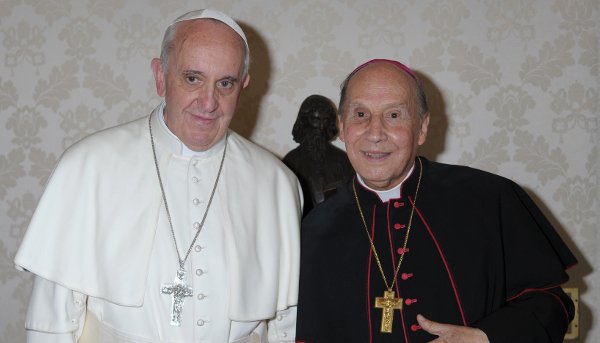Opus Dei makes move into the Vatican inner circle
The Vatican named former Fox News reporter Greg Burke as its new spokesman on Monday, the first time a U.S. citizen has been entrusted with leading the pope’s communications team.
Burke, who is a member of the conservative Catholic group Opus Dei, was hired by the Vatican adviser four years ago at a time when the Roman Catholic Church was mired in leaks scandals and stuck in a public relations quagmire.
On Monday, the Vatican announced that Burke would become the pope’s official spokesman, with Father Federico Lombardi stepping down from the role which he had held for 10 years.
Spanish radio reporter Paoloma Garcia Ovejero will become the deputy spokesperson—the first time a woman has had such a senior role in the Vatican communications department.
Burke, 56, a native of St Louis, Missouri, was Fox’s Rome-based roving correspondent for Europe and the Middle East before joining the Vatican. Prior to that he worked for Time magazine in the Italian capital for a decade.
He worked as a stringer for Reuters in Rome early in his career and has also written several books, one about an Italian soccer team.
WHAT IS OPUS DEI?
The activities of Opus Dei are not without controversy. According to the Opus Dei Awareness Network, Despite its seemingly noble intentions, Opus Dei has stirred up controversy in countries all over the world. Families of Opus Dei members are almost never involved in the vocation process, (in fact Opus Dei itself often discourages its new members from even telling their families about their decision – the following testimony demonstrates how Opus Dei has ignored directives from Church superiors to cease recruiting minors and to require they discuss the matter with parents before making any commitments to Opus Dei: Opus Dei Recruits Minors and Deceives Church Officials) Also questionable are Opus Dei’s recruiting tactics, which are comparable to the tactics used by cultic groups.
In the early 1980’s Opus Dei was granted designation as a “personal prelature” within the Church. A personal prelature is an entity within the Catholic Church that is headed by a “prelate” (currently Javier Echevarria) and defined by persons rather than by geographical area (such as dioceses). Therefore, local bishops have little control over Opus Dei’s membership, activities or practices.
In 2002, Opus Dei’s founder, Josemaria Escriva de Balaguer, was canonized in Rome, Italy on October 6 after having been beatified amidst substantial controversy in 1992. There were many irregularities involved in Escriva’s swift canonization (he died in 1975), including the refusal to accept the testimonies of almost a dozen people who opposed the canonization and knew Escriva personally, including Maria del Carmen Tapia, Father Vladimir Feltzman and John Roche; the elimination of the Devil’s Advocate from the canonization process, a change effected with the participation of Opus Dei’s first prelate, Alvaro del Portillo; and the authentification of miracles by Opus Dei doctors, along with other conflict of interest issues.
Opus Dei has stated that there are approximately 80,000 Opus Dei members worldwide. Opus Dei is located in many countries, including England, Spain, Italy, Ireland, Canada, Mexico, Japan, Australia, the Philippines, countries in Central and South America, and many others, including the United States. Opus Dei generally locates in or near major cities, often near prestigious universities, where they hope to attract recruits.
(Reporting by Crispian Balmer; Editing by Alison Williams)
___
http://www.trunews.com/article/opus-dei-vatican-inner-circle?utm_medium=post&utm_source=twitter

